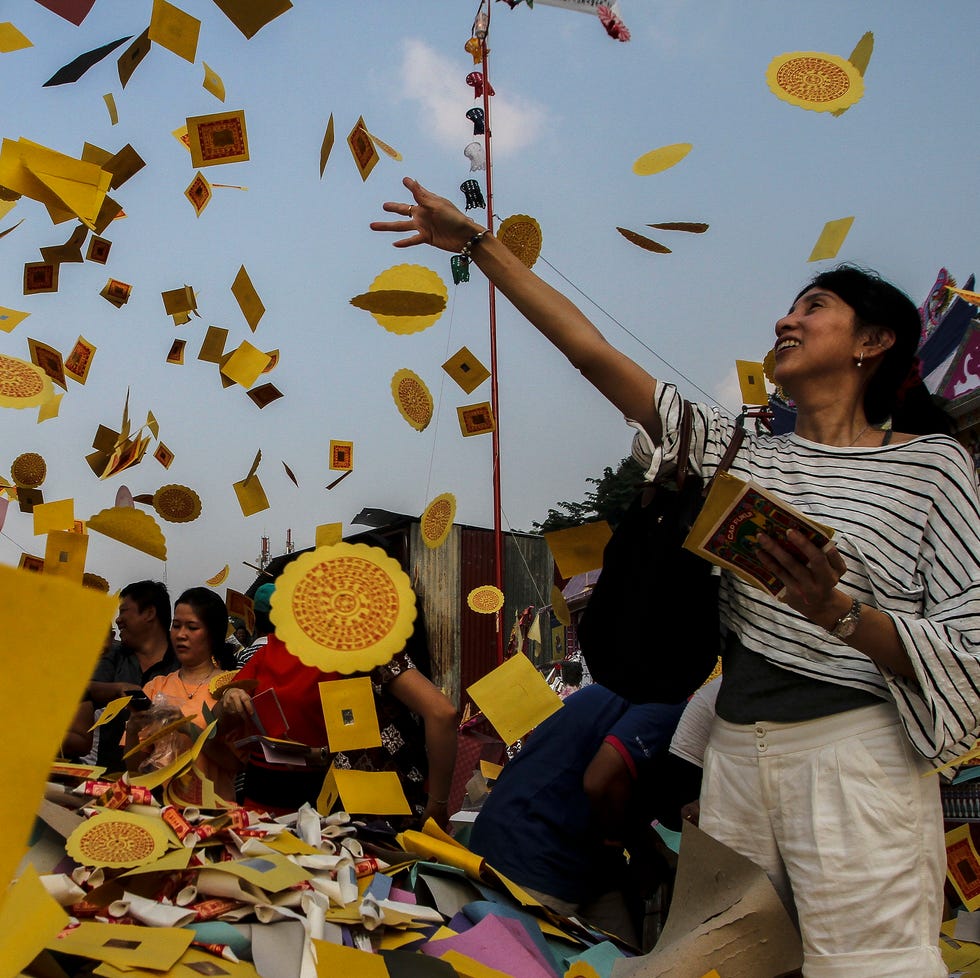The Hungry Ghost Festival, an annual celebration that takes place during the seventh month of the Chinese lunar calendar, caps a period of respect, veneration and caution towards the spirits of dead ancestors.
“The Hungry Ghost Festival is considered a time of reunion and remembrance, strengthening the bond between the living and the deceased,” says Jenelle Kim, a doctor of Chinese Medicine and author of Myung Sung: The Korean Art of Living Meditation."
Chinese tradition says that during Ghost Month, the gates of hell fly open and restless spirits spill out to wander among the realm of the living. During this time, primarily Chinese communities across the world observe practices rooted in superstition that symbolically appease, comfort and fulfill the spirits. You’ll notice that people engage in ritual and avoid some practices in order to remain safe from spiritual harm during Ghost Month.
The origins of the festival are rooted in Taoism and Buddhism. In China, the Hungry Ghost Festival is called Zhongyuan Festival by Taoists and Yulanpen Festival by Buddhists. While some call the Hungry Ghost Festival “Chinese Halloween,” the festival is more similar in tradition to celebrations like Día de los Muertos in Mexico, Chūgen and Bon in Japan, Pchum Ben in Cambodia and Sat Thai in Thailand.
“The Hungry Ghost Festival is a religious observance and an integral part of East Asian culture. It showcases the beliefs, traditions and values of the community, fostering a sense of unity and shared identity,” says Kim.
What is the Hungry Ghost Festival?
While the Hungry Ghost Festival and Ghost Month are all about honoring and respecting deceased souls by paying homage through various symbolic and spiritual practices, the nuanced meaning of the holiday differs based on whether you emphasize the Taoist or Buddhist origins.
According to the National Library Board of Singapore, the Taoist tradition emphasizes the importance of appeasing and pacifying wandering souls who are released from the underworld during the Ghost Month, while the Buddhist religion underscores the importance of filial piety, which is a Confucianist virtue that values respecting one’s parents, elders and ancestors.
In Chinese Heritage in the Making: Experiences, Negotiations and Contestations, scholar Selina Ching Chan writes that in the Chinese Buddhist tradition, the Hungry Ghost Festival is associated with the story of Mulian, which is the Chinese name for Buddha’s disciple Maudgalyâyâna. In this well-known Chinese Buddhist tale, Mulian saves his mother from punishment in hell through ritual chanting. The story has been re-enacted since the Tang and Song dynasties in China through annual local operas that are performed during Hungry Ghost Festival.
Chan writes that starting with the Song dynasty, Taoist traditions became integrated into the Hungry Ghost Festival. The Taoist tradition emphasizes the needs of hungry ghosts who have been released during Ghost Month. Opposed to peaceful spirits or one’s own family members, hungry ghosts are often those who experienced tragic or wrongful deaths.
For instance, the earliest performance of the Chaozhou Hungry Ghosts Festival in Hong Kong was organized by a group of migrant workers from Chaozhou, writes Chan. The migrants moved far from their families of origin, were unmarried, and worked dangerous jobs at the piers to make a living.
“In the [Hungry Ghost Festival] rituals, they commemorated these bachelor fellow-workers who died from industrial accidents or misfortune. It was believed that these people would become vicious ghosts if they were not properly worshiped after death,” she writes. “The Hungry Ghosts Festival was therefore meant to pacify those who died due to misfortune and to ensure that peace and order would prevail in the local community.”
When is the Hungry Ghost Festival?
“The festival is based on the belief that during the seventh month, the gates of hell are opened, and the spirits of the deceased, particularly restless and hungry spirits, are released to visit the living realm,” says Kim. “It is believed that these spirits have unfulfilled desires and seek comfort, offerings, and prayers from the living.”
The Hungry Ghost Festival takes place during a single day of Ghost Month, which is during the seventh month of the Chinese lunar calendar. This year, the Ghost Month corresponds approximately to August 4 to September 2, 2024 in the Gregorian calendar.
The Hungry Ghost Festival is usually held on the 15th day of the seventh month of the lunar calendar, though some regions celebrate it on the 14th day of the month.
How should I celebrate the Hungry Ghost Festival?
People celebrate the Hungry Ghost Festival through various rituals designed to honor, acknowledge and satisfy the spirits of the dead. These practices include active objects and gestures that people can offer to spirits and also superstitions and practices to avoid during Ghost Month.
“The Hungry Ghost Festival involves various rituals aimed at appeasing the hungry ghosts and providing them with offerings. People make food offerings, burn incense and joss paper and set up temporary altars or stages for performances. These offerings are meant to provide nourishment and fulfill the needs of the wandering spirits,” says Kim.
Practices to do during the Hungry Ghost Festival:
Along with things to do during the Hungry Ghost Festival and Ghost Month, you’ll want to make sure to avoid some activities that could warrant the unwanted attention of hungry ghosts. Kim says, “During the festival, certain taboos are observed to avoid attracting the attention of malevolent spirits…These customs are followed to protect oneself from unwanted spiritual encounters.”
Practices to avoid during the Hungry Ghost Festival:
Minhae Shim Roth is a writer and reporter based in the San Francisco Bay Area.















